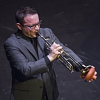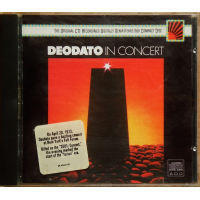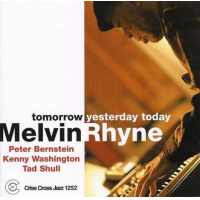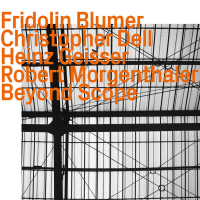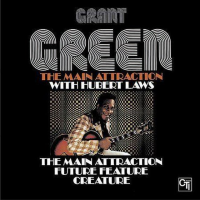Home » Jazz Articles » Liner Notes » Larry Goldings & John Sneider: Chinwag
Larry Goldings & John Sneider: Chinwag
The music suggests multiple eras and multiple dimensions—a new conversation between old friends, a bold exercise in free improvisation and spontaneous composition, and today’s vision of a future firmly rooted in the past.
Chinwag, which literally means "a conversation between friends," is the most recent expression of the long and ongoing friendship between Goldings and Sneider. Massachusetts natives of the same generation, both grew up with a love of bebop and electronic music. By the time they began playing together on the early '90s New York music scene—working regularly at clubs like Augie's and the Village Gate—each had become a devotee of hard bop and had developed a common musical language.
"We go way back," says Goldings. "John was certainly the first great trumpet player I ever played with regularly." Today Goldings, who eventually moved to Los Angeles, has become one of the most iconic keyboard players of his generation, due in large part to his diversity and flexibility both on stage and in the studio. Sneider has also spent his fair share of time in recording studios and on stages and in recent years has been releasing regular hard bop statements, including 2021's The Scrapper which also featured Goldings on organ.
Larry and John flirted with the idea of making a duet record for years. On Goldings' 2009 Quartet record, for example, they played a haunting duo version of "We Shall Overcome," and before that, on Curtis Stigers' 2005 album I Think It's Going To Rain Today, they recorded a duo version of the title track. In fact, it was during the Stigers recording sessions that the idea of doing a full fledged duet project first appeared.
As Goldings explains, "The impetus of us playing duo came out of that experience. We realized we had something special together when we did that Curtis stuff."
After years playing on recording sessions in Los Angeles, Goldings says that he learned to consider how different instruments can change the way music gets played. "One of the things I've learned watching good engineers is that recording a piano is not just recording a piano. It's really about which piano is going to be right for this particular cue or this particular mood. Pianos are all different."
And as a long time admirer of the 1970s duo recordings by trumpeter Doc Cheatham and pianist Sammy Price, Goldings imagined revisiting the format with a fresh take. "I had this idea: What if we do something like those Doc Cheatham records, but on an upright piano? Just something really intimate that sort of looks to the past and the future."
So choosing both how to record the piano, and which piano to record, was at the top of his mind. Chinwag was recorded by Sheldon Gomberg at his Carriage House studio, a veritable playground of unusual instruments, including the 100 year old Wing and Son upright piano used to evoke the nostalgia of a sepia toned, bygone era.
"That is such an unusual piano," says Goldings. "It narrows the way I'm going to play. You can't play just anything on the Wing, it has this crazy natural reverberation, for instance. It just begs you to play something slow and open. It sets a mood."
The choice of Sheldon Gomberg to record the project also went beyond the casual or convenient. Gomberg is an extra-musical engineer who contributed musically as well as technically to the production. Sneider says, "I just felt like he was a total compatriot both from the musician side and engineering side."
While the music on Chinwag finds Goldings narrowing his focus to accommodate the Wing piano, it is also an example of how, over time, he has happily explored music outside of the bebop language. Goldings puts it this way: "I'm just trying to get to the essence of something, and I'm getting away from a jazz vocabulary here and there. But still using what we need to have as jazz musicians—and that is openness, good ears, good time, making good decisions."
Recently, isolated in his house during social distancing, Larry reconnected with another of his first loves: playing with synthesizers. At the start of the pandemic, he began to explore electronic instruments in earnest, and one of the devices that excited him the most was a handheld, portable machine called a "pocket piano."
He says, "It occurred to me that maybe this is not just something that I mess around with at home. This is part of my past, this interest in synths and portable things. I could bring it to a recording session. I had been using this thing a lot and I just thought it was something that would send us in another direction and, particularly with someone like John."
So by the time the two walked into the Carriage house to record, there was already a general musical direction, a bit of momentum, and an openness to happy accidents. Sneider remembers, "We recorded Steven Foster's 'Beautiful Dreamer' and Larry's original 'Salad Days' and I vowed to come back soon and see this project through."
Over the course of two more sessions, Chinwag came further into focus. Sneider's original "Sepia" was inspired by the sound of the first meeting, and Goldings' "The Great Zamboni" was composed on the spot in the studio.
The project was still taking shape even up to the final moments of recording, "We already had all this material amassed and then we decided to do the old tune 'Laugh Clown Laugh,'" says John. "We did it in one take. A lot of the stuff on the record is one take. We decided to just play some tunes for fun. I said, 'Sweet and Lovely.' And then Larry said to pick another one. I said, 'In Walked Bud.' And even though I thought we were coming back to finish mixing the record, it almost took a different turn at the last minute."
"Laugh Clown Laugh"—featuring Larry on pocket piano, Wing upright and organ—became the opening track on record and sets the tone for the project. "It's got all the elements of the record, and it instantly tells you that it's gonna be different. I wanted to make that point in the beginning," says Larry.
So while Chinwag explores a classic American repertoire (by the likes of Stephen Foster, Eubie Blake, Rodgers & Hammerstein and Thelonious Monk) the music suggests multiple eras and multiple dimensions—a new conversation between old friends, a bold exercise in free improvisation and spontaneous composition, and today's vision of a future firmly rooted in the past.
Liner Notes copyright © 2026 Leo Sidran.
Chinwag can be purchased here.
Contact Leo Sidran at All About Jazz.
Multi-instrumentalist, composer, producer and podcast host.
Track Listing
Laugh Clown Laugh; The Great Zamboni; The Veldt; Love Will Find a Way; Sweet and Lovely; Hesitation Blues; Diary of a Lost Girl; In Walked Bud; Beautiful Dreamer; Salad Days; Sepia; Berkshire Dawn; Chinwag; Briar Rose; Napoleon Contest; If I Loved You.
Personnel
John Sneider
trumpetLarry Goldings
organ, Hammond B3Additional Instrumentation
Larry Goldings: Critter & Guitari pocket piano; Jenko Celeste; Harmonium; Yamaha CD Reface.
Album information
Title: Chinwag | Year Released: 2024 | Record Label: Sticky Mack Records
Tags
PREVIOUS / NEXT
John Sneider Concerts
Support All About Jazz
 All About Jazz has been a pillar of jazz since 1995, championing it as an art form and, more importantly, supporting the musicians who make it. Our enduring commitment has made "AAJ" one of the most culturally important websites of its kind, read by hundreds of thousands of fans, musicians and industry figures every month.
All About Jazz has been a pillar of jazz since 1995, championing it as an art form and, more importantly, supporting the musicians who make it. Our enduring commitment has made "AAJ" one of the most culturally important websites of its kind, read by hundreds of thousands of fans, musicians and industry figures every month.


